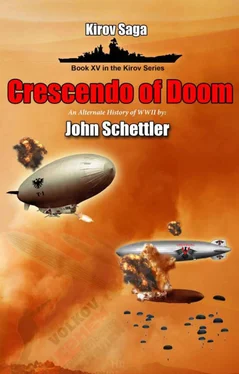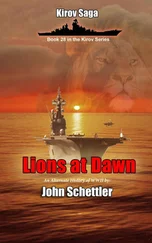“It says that sir? It names Volkov like that? It names you personally?”
“You heard what I read.”
“But how is that possible, sir? Is it a history? Are you certain the work is fictional?”
“So the author claims…” Karpov’s eyes narrowed. “That damn stairway,” he hissed. “Who knows how many men may have gone up those stairs, Tyrenkov? Who knows how many came down? Clearly that stairway existed in the future—in the world Volkov and I came from. People may have used it, and we have already established that there is a definite connection between that time and at least two other eras in history. One is that damn war, your time, the 1940s. And another is this time before the revolution. You proved that connection exists by taking that journey there to the future and returning here safely just now. What if this man was another traveler, this Yuri Rudkin?” he stared at the name on the spine of the book. “Yes, that is the only possible explanation. Look here!” He showed Tyrenkov a sketched plate in the volume, where airships dueled in the stormy skies.
“Look at the caption! It reads: “Volkov’s fleet in the great air duel above Ilanskiy, and the wreck of the last Siberian Airship Krasnoyarsk —‘Old Krasny.’ The fall of ‘Big Red’ marked the end of the rebellion in the east, uniting all of Siberia under Volkov’s rule.”
Karpov gave Tyrenkov a dumbfounded look. “Now how in God’s name is that possible? I can see that this man might have dreamt up such a tale, but with these names? My God! He even calls the Krasnoyarsk Big Red, just as we do! That is too much of a coincidence. This man had to have seen the past he was writing about.”
“Yet you say it is a fiction, sir—just a story.”
“A very clever story,” said Karpov, flipping one page after another, thinking. “A very clever man… What if he came from the future, just as Volkov did, and saw things—learned things about that past. Only this time he gets back home again. Yes… He returns safely home to his own day. Who knows what he thinks about his experience? But it is clear that he saw things from the time of the Great Patriotic War. Yes, he learned enough to gather the fodder for his tale. He used the things he discovered to create this story.”
“But how is that possible, sir? Suppose he did as you suggested, and saw the 1940s. He would be writing about the very same man I saw getting off that train. Volkov was there, if I am not mistaken—but the book was there as well! So none of the history this other man saw was even written yet, because, at that moment, Volkov had not yet discovered that stairway.”
Karpov nodded, eyes shifting about the room, and back to the book in his hand. “Unless…” He paused, as if uncertain, feeling his way forward in his thinking, trying to grasp at something that might explain this strange anomaly. “Unless Volkov’s journey was inevitable .”
That word seemed leaden as he spoke it, weighing on his very soul. Yes, he thought, inevitability—fate—doom. That notion was deeply seated in the Russian psyche. A man’s fate was his fate, and nothing could change it. Was Volkov fated to go down those steps? Was it inevitable? Dominoes of thought tumbled one after another in his mind, the click and clatter of their fall harrowing him inside.
If it was inevitable, then anything he had planned now for Ivan Volkov was doomed to fail. Tyrenkov may go back up those stairs to try and kill the man, but it would fail. Otherwise how does this author ever learn of the events he describes so chillingly in this story? Every page he turned was riveted with things from the world that Karpov knew—the world he had come from until that storm over the English Channel sent them here to 1909—here to this place where he thought he could rewrite all history. Was it still possible? Was this book a clear and evident sign that he would also fail? Was his own fate as inevitable as the words this man used to describe it here… Vladimir Karpov… dead and gone from this world…”
“What do you mean, sir? Inevitable? Then you are saying that Volkov must go down those stairs, and reach the time before the revolution?”
“How else could this writer have come up with this tale? It is too pointed. He named the ships perfectly— Abakan, Angara, Tomsk —all engaged in the battle by Volkov’s 1st Air Division. My God, look here! He even says that this Division had been mauled earlier in an unsuccessful raid on the Trans-Siberian Rail, when Oskemen and Alexandra were destroyed by the rebellious Siberian fleet led by Admiral Karpov.” His finger ran along the lines as if chasing impossibility itself. It was the battle he had fought earlier, Volkov’s raid on Ilanskiy after the Omsk Accords, the treachery that re-ignited the conflict on the eastern front. And it was all described here in this little book of history, posing as a fiction, for it was now obvious to him that Tyrenkov’s objection had to stand.
“Yes,” he began. “this book could not exist, at least not as history, in that future world before Volkov ever came to Ilanskiy. And I think the world you saw had to be the one I came from. Otherwise why would Volkov be there, just as he was ordered by Director Kamenski, looking for Fedorov along the Trans-Siberian Rail? In that world none of the days you and I have lived out together ever happened! Don’t you see? In the world I came from there was No Free Siberian State, no Orenburg Federation. And yes, there was no Admiral Karpov leading his fleet of airships over the taiga—and no Ivan Volkov in Orenburg either!” He smiled, finally getting the tiger by the tail. Yet what would happen if he pulled on that tail? There was still a light of uncertainty and fear in his eyes, even as he spoke.
“Yet this book could not exist,” he mused, “even as a fiction, unless those events occur. It is too detailed in its depiction for this man to have imagined it. The events described in this prologue, as far as I have seen, are exactly those we lived through.”
“Then what about the rest of the story, sir? What if the rest is inevitable?”
Karpov nodded. “Yes… If this book was on that table than it certainly means one thing—Volkov goes back in time. He goes there and this man, Rudkin, saw the things he did to change the history. So we fail to kill him here and now. We fail! Otherwise how can this book ever be written? This man filched the entire story he passes off as a fiction here—he stole it right from the history we were writing.”
Tyrenkov had a crestfallen expression on his face now. “Then we are defeated sir? Volkov wins?”
“This book seems to recount that outcome, but I am not prepared to let that stand. Look here, Tyrenkov, look what I hold in my hand, the book of fate itself! Yes, it lays out the tale of my own undoing. It describes this last desperate battle between the airships of Orenburg and Siberia. Facts that riveting send a chill up my spine, for right alongside them is that little line about my own death. You see? It’s right here… ‘today he would put an end to the last of the Siberian Fleet, now that its Admiral had gone missing in that terrible storm.”
“That can only mean the storm we encountered over the English Channel,” said Tyrenkov.
“Exactly! It removed me from that time, and then all the things you warned me about must have come true. Without my leadership Volkov is able to win the day, right here in this battle Rudkin describes.” He looked at the title again, “ When Giants Fall …”
“But can’t we prevent all that,” asked Tyrenkov? “Can’t we stop him now, sir. Perhaps I lingered there too long. It could be that Volkov is no longer in sight when I go back to that window on the upper landing. That could be the reason we failed. Perhaps there simply wasn’t time for me to get there and take aim before he slipped away. Well, we can plan this very carefully now. Forget that sniper rifle. I can pick a squad of our very best men. We will leave nothing to chance or fate.”
Читать дальше












